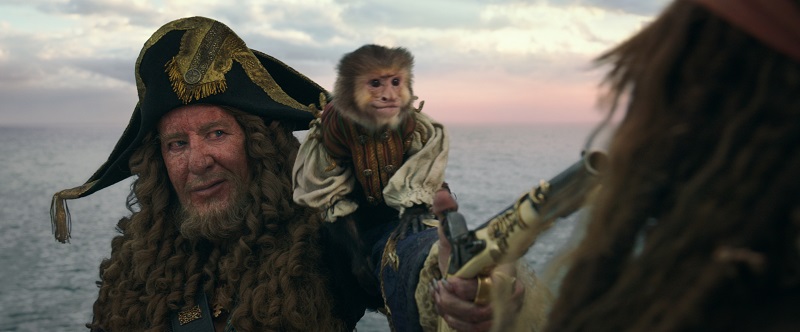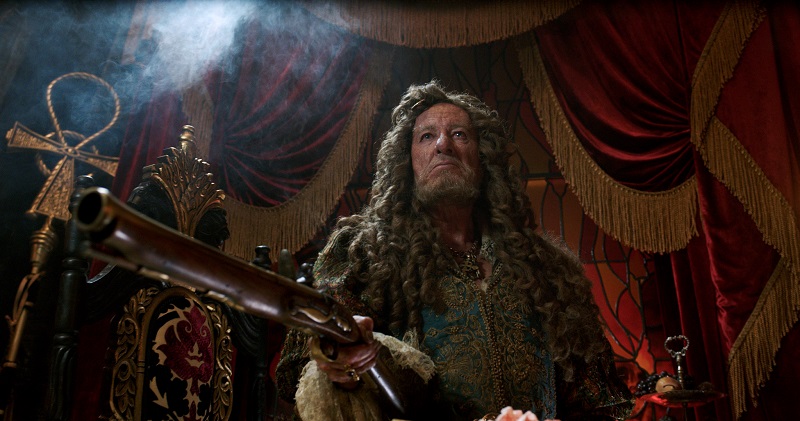Other than Johnny Depp, no one knows the world of Pirates of the Caribbean more than Geoffrey Rush. His Captain Barbossa has been in all of the blockbuster movies, culminating with his fifth turn in Pirates of the Caribbean: Dead Men Tell No Tales.
At the recent press day, Oscar winner Rush reflected on the almost decade and a half journey he has been on in this Jerry Bruckheimer produced, Johnny Depp starring juggernaut and shared some fantastic stories about making the film series, especially some of the incredible challenges he faced in Dead Men Tell No Tales.
The film also features another Oscar winner in Javier Bardem, who plays our villain and is easily the nastiest of the quintet of evil doers in the Pirates universe. Rush talks about another one of his co-stars in great length, the one audiences adore… you know — that adorable monkey who is always on his shoulder!
Q: What do you think it is about the lore of pirates? These guys are outlaws — the scourge of society at that time. But we, as a human race, can’t get enough of these stories.
Geoffrey Rush: I love the authenticity of how grimy and the maritime qualities of being at sea — the brotherhood, which it was. They went offshore on boats and for their particular governments or monarchs. The Protestant British, the Catholic Spanish and the Portuguese, [they] condoned piracy because you’d bring back some loot and you can keep a percentage for yourself, which they would share. So there’s a philosophical spirit behind it. It’s a pretty ugly sort of historical phenomenon. But somehow in literature, they’ve caught imagination.
Q: Do you feel that much of the appeal of this pirates story is the one at the center of it, Captain Jack Sparrow?
Geoffrey Rush: The writers on this have kept this from the beginning of the films that Jack is an anti-hero who has a special compass that says “go” in this direction. Wherever it points, he’s an existential outlaw who goes, “I’m going to go there.” It’s that desire to go, “I can be irreverent. I’ll take my chances and meet the moment.” You could write philosophical books about existentialism and living in the moment. Jack Sparrow is a personification of that. I think audiences find that very attractive. Even kids dress up as pirates.
Q: Tell us about the history of the hat… It is hard to imagine Barbossa without that hat.
Geoffrey Rush: Barbossa’s hat is very important. In the very first costume fitting, we tried it without the hat, and he just sort of disappears. I looked in the mirror and said, “Where has he gone? Where’s the vanity?” It’s in the brain, it’s the feather. It’s a nice little haven for the monkey.
Q: They say don’t work with animals. But, you seem to not mind working alongside that monkey. Is it a joy?
Geoffrey Rush: The monkeys are trained so brilliantly — the best job in the world. People can complain about animals used in films. Look, relative to my trailer, the monkey is in a five-star hotel. But the monkey is trained to have no relationship to me whatsoever. If it gets too close, it will want to start grooming me and bonding. If I pull a sword out, it would get frightened. So the monkeys relate only to the trainer, who gives them rewards. Pablo and Chiquita, there were two monkeys. I love it because there’s a comfort zone for me. Every time the monkey is on my shoulder, I get this warm, aromatic peanut breath. Barbossa is such a crusty old bastard and the monkey is so cute. Barbossa often gets lumbered with big expositional speeches and I was in the middle of one in this film, and suddenly there was this hurl of fluid, coming off my shoulder and all over my arm and my face and costume, which was a mixture of mushed peanuts, banana and coconut milk. And I thought, “Everyone is a critic.”
Q: Was there one scene in Dead Men Tell No Tales that you could not wait to get through because it was beyond challenging for you?
Geoffrey Rush: Thank god for Kaya Scodelario. She had worked on a film, I think one of The Maze Runner series, and she asked me, “Are you doing a scene where you have to hang upside down?” And I said, “Yeah, a little bit worried about that.” She said, “Do be.” She’d done a scene where she was hung upside down with dialogue for maybe 15 minutes at a time. But she’s young, athletic, brilliant and all that. I made a deal with the director. We have to shoot that with a line of dialogue at a time because it’s a lengthy scene. And boy, how ugly do we look? Barbossa upside down, with his own moth-eaten hair falling down, my eyes like this – it wasn’t a pretty sight. Javier and I had to keep the knife edge… he could have killed me at any point, but he knows that he can’t. But I thought cutting to 30 pirates hanging upside down just enhanced Salazar’s rage and his malevolence.
Q: There is a particularly emotional moment in the film for Barbossa. Without giving away too much, how on earth does one prepare for a seismic shift in one’s character like that?
Geoffrey Rush: I had to suppress a lot of tears. Thank goodness I was wet. We couldn’t see Barbossa weeping. When I read the script, I looked back at the other films to see if this made sense. If that “secret” is known because it happens when Barbossa and Jack were younger. When he finds out the truth, you need a therapist to work through what he’s been hiding.
Q: Does one ever get “used” to Johnny Depp improvising?
Geoffrey Rush: The script is sort of set and we shoot fast and furious. It’s a lot of discipline because it’s a very industrial site, particularly in this one. Well, even more so in the first ones where we were always out on boats for week after week. But with Johnny, it’s always been the back story that I mutinied and took the Black Pearl and it’s always been like a marriage. I think now it’s more like the Black Pearl is the most beautiful girl in the world and we’re fighting over the same girlfriend. But Johnny does occasionally throw in some lines that come out of nowhere. I love the scene in which he is shanghaied into the marriage, saying, “How did I get here, what’s going on. I don’t want this.” Thankfully, Hector, his enemy shows up and Johnny on the day adlibbed a line, complete non sequitur at his wedding, and said, “Did you bring me a present?” [Laughs] That’s so Johnny, so Jack, that irreverence and absurdity. It’s a smoke screen that Jack Sparrow uses. That you don’t know whether he’s greatest, luckiest hero in the world or is he sometimes just a complete idiot?



